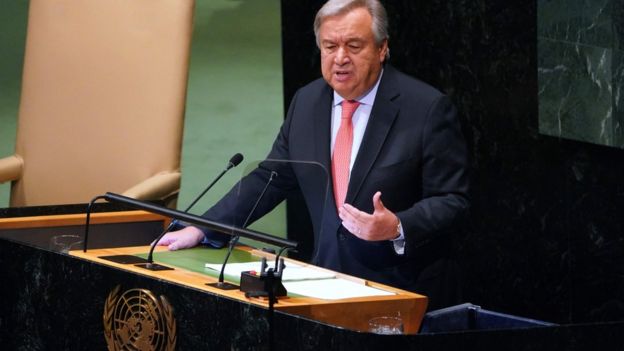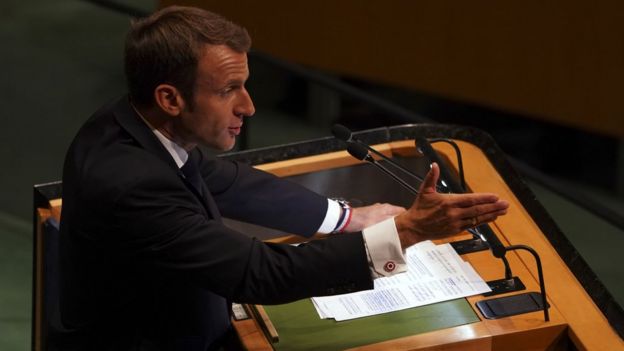
This article is more than
7 year oldAddressing the United Nations General Assembly in New York, he defended his decision to abandon the nuclear deal.
Mr Trump also boasted that his administration had accomplished "more than almost any" other in US history.
His words were greeted with laughter but he laughed back, saying: "Didn't expect that reaction."
Trump starts with a state of the union at UNGA. Laughs from the audience when he boasts that his administration has achieved more than almost any other in US history. "I didn't expect that reaction." he says, chuckling himself. A clip that will enter the UN annals #UNGA
— Nick Bryant (@NickBryantNY) September 25, 2018
The United States was stronger, richer and safer, Mr Trump insisted.
He also defended his administration's nurturing of better ties with North Korea and its hard line on trade with China.
One of his key themes, however, was the right of America to pursue its own path in the world.
"I honour the right of every nation in this room to pursue its own customs, beliefs and traditions," he said.
"The United States will not tell you how to live or work or worship. We only ask that you honour our sovereignty in return."
By contrast, French President Emmanuel Macron argued passionately in favour of multilateralism.
By James Robbins, BBC diplomatic correspondent
The immediate headline may be Donald Trump's replacement of North Korea by Iran as global enemy number one, but there was much more to his speech than that.

Last year's assault by the president on the United Nations and its multilateralism - the effort to bring groups of countries together to pursue a common goal - was vastly amplified this year.
It was amplified partly by Mr Trump's complete condemnation of globalism in general and of the International Criminal Court in particular, but also by his even stronger championing of individual national sovereignty, love of country and patriotism.
For Mr Trump that is the only path to freedom and securing the rights of America's people.
The UN secretary general provided a clear counter-narrative in his speech. Antonio Guterres was careful not to target President Trump by name but his message was transparent. He warned of a world walking the road of populism and isolationism once more, ignoring the lessons of 20th Century history - particularly in the 1930s - and risking a descent towards another global conflict.
After today's speeches the canyon which divides multilateralism's detractors and its defenders is more starkly visible, more blindingly lit, than ever before.
"Iran's leaders sow chaos, death and destruction," he said.
"They do not respect their neighbours or borders or the sovereign rights of nations. Instead, Iran's leaders plunder the nation's resources to enrich themselves and spread mayhem across the Middle East and far beyond."
In August, the US reinstated sanctions targeting the Iranian government's purchase of US dollars, Iran's trade in gold and other precious metals, and its automotive sector.
In November, a second batch of potentially more damaging sanctions will be reimposed on Iran's oil and shipping sectors as well as its central bank.
Iran has accused Mr Trump of waging "psychological warfare" against it. and denies any involvement in terrorism. It insists its nuclear programme is entirely peaceful.
Remaining members in the nuclear deal - the UK, China, France, Germany and Russia - say they will set up a new payment system to maintain business with Iran and bypass US sanctions.
The system would facilitate oil companies and businesses to continue trading without relying on the US-led global market and dollar, but exactly how the system would work is still being determined.
The US leader said his meeting with North Korean leader Kim Jong-un in Singapore in June had led to developments unimaginable only a few months ago.
He said North Korean missiles and rockets had stopped flying in all directions, and North Korean nuclear testing had ceased.
"With support from many countries here today we have engaged with North Korea to replace the spectre of conflict with a bold and new push for peace," he said.
"I would like to thank Chairman Kim for his courage and for the steps he has taken, though much work remains to be done."
Sanctions, he said, would stay in place until North Korea's "denuclearisation occurs".
On Monday, Mr Trump said he expected a second summit with Mr Kim soon.
Mr Trump also praised India for raising millions of people out of poverty "and into the middle class", hailed Saudi Arabia's "bold, new" reforms, commended Israel as a "thriving democracy" and said Poland was a country that stood up for its own sovereignty.
Speaking after Mr Trump, France's centrist president said that he would "never stop upholding the principle of sovereignty" but it should not be used as a weapon.

"I will not leave the principle of sovereignty of peoples in the hands of nationalists who use it to attack the universality of our values," he said.
Arguing for dialogue, he said: "I do not believe in the law of the strongest... I believe in a third way which obliges us to push through a new model, a new global balance.
"We will not win in the 21st Century except with a strong multilateralism."